
Periods are many things: messy, emotional, annoying, normal. And yet periods are at the center of a controversy revolving around Pixar's animated film "Turning Red," which depicts 13-year-old Meilin Lee who transforms into a huge red panda when experiencing heightened teenage emotions — a not terribly subtle metaphor for the bodily discomfort preteens experience during puberty.
And for some reason, people had a problem with it. Parents took to Twitter to complain that the movie's content was too mature for children to view. One critic argued that parents would have to answer one too many questions after their children viewed the film. And The Federalist griped that "if you aren't a progressive-leaning teenage girl or suffering from 2000s zombie nostalgia, then this film isn't likely for you." It seems odd to be vexed about a phenomenon as universal as adolescent puberty.
Of course, it's not just puberty that they're objecting to, but menstruation specifically. After all, the "Teen Wolf" franchise and similar projects have often explored the physical coming of age through fantasy storytelling. What's significant is that the "Turning Red" debate speaks to the general underrepresentation of menstruation in Hollywood. Rayka Zehtabchi, the director behind the 2019 Oscar-winning Netflix documentary short "Period. End of Sentence." found that the best way to spark dialogue around menstruation is through storytelling.
RELATED: How the red panda became the face of cute rebellion, from "Turning Red" to "Aggretsuko"
But what is the quality of that storytelling? As the furor over "Turning Red" reveals, periods – especially the first ones that a pubescent child experiences – are not widely embraced as acceptable on our screens. Or, when they do show up, they're depicted with an air of secrecy, shame or straight-up horror. What kind of messaging is that?
Despite the naysayers, the depictions of periods have improved greatly over the years, but that hasn't always been the case. Salon reflects on the effectiveness of portrayals throughout film and TV history of characters who get their first period (aka menarche) on screen — the good, the bad and the very ugly.
"Carrie" (1976)
The scene: In the chilling 1976 adaptation of Stephen King's novel, timid teen Carrie (Sissy Spacek) begins unleashing supernatural powers in response to abuses she suffers by her mother and classmates. Her first period marks the beginning of her unraveling. As bright red blood streaking her hands and legs, Carrie shrieks and huddles naked in a dirty gym locker room as jeering female classmates hurl tampons at her, screaming, "Plug it up!" Even her teacher commands, "Stand up and take care of yourself!" and slaps her. By the end of the film, having Carrie drenched in pig's blood is a visual reminder of the blood that started it all.
Verdict: Directed by Brian De Palma and written by Lawrence D. Cohen, the scene became one of the best known depictions of a menstrual cycle in popular culture. Thanks, guys! Yet its shock value rests on painting Carrie's period as alien and crude — the source of Carrie's discomfort in her body. It also inextricably intertwines menstruation with brutal social humiliation and the onset of malevolent women's powers.
"The Blue Lagoon" (1980)
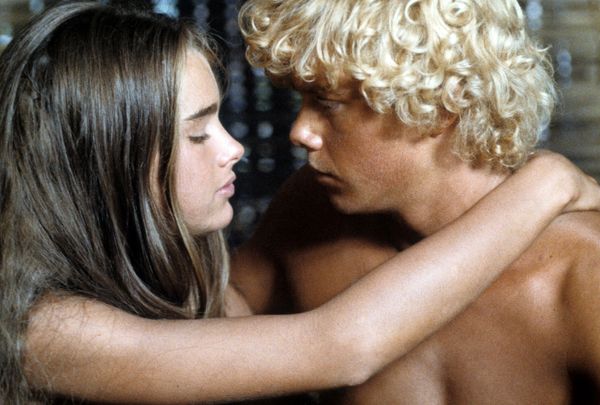
"The Cosby Show" (Season 7, Episode 9 – 1980)
The scene: In "The Infantry has Landed (And They've Fallen Off the Roof)," the adorably matter-of-fact Rudy (Keshia Knight Pulliam) gets her period. And in contrast to the horrific embarrassment portrayed in "Carrie" or "Blue Lagoon," Rudy's period is treated as a glorious passage through the gates of womanhood. "Just think Rudy, you're the first one in our group to get it," her friends whisper conspiratorially in Rudy's bedroom. "You even look a little more mature." "Well, I did feel a little older walking home from school today," Rudy responds, tilting her chin upward with an air of pretension. "Don't worry, you'll get yours soon."
Verdict: "The Cosby Show" acknowledges the existential anxiety one experiences before their first cycle ("My sister's friend knew somebody and when she got her period she was so weak, she had to be carried around in a stretcher for three months," Rudy's friend warns) while comically poking at its absurdity. For Rudy, her period is a bragging right, something she can use to inform her less-experienced gang of thirteen year old friends. The episode offers a refreshing, confident response to menstruation.
"My Girl" (1991)
The scene: Eleven-year-old Vada Sultenfuss (Anna Chlumsky) is on the cusp of a summer of firsts — first crush, first kiss, and yes, first period. "Oh my god!" she screeches upon discovering she's bleeding. "I'm hemorrhaging." A young Jamie Lee Curtis gives a solemn talk about sex and periods to a comically incredulous Vada. "It's not fair; nothing happens to boys," she says, casting a disgruntled look toward the ground. When her best friend Thomas (played by a mini Macaulay Culkin), comes knocking with an ill-fated request for play-time, she shoves him to the ground. "Don't come back for five to seven days!" she exclaims, slamming the door.
Verdict: From writer Laurice Elehwany, the film's depiction of menstruation is endearing if unhelpful. It falls into the common period trope of the embarrassed young girl's sudden bodily shame accompanied by her clueless male counterpart.
"Degrassi" (Season 1, Episode 9 – 2002)
The scene: In "Coming of Age," Emma (Miriam McDonald) gets her first period while she's wearing a white skirt. Oops! As a Hail Mary, she swaps out borrowed too-large gym shorts that keep slipping down. As the preternaturally confident Emma marches to the front of the class – with best friend Paige (Lauren Collins) holding up the shorts for her – she delivers a book report to an audience of jeering preteen boys. "Ahhh did Emmy pee her pants?" they leer. "No, I just got my period for the first time," Emma replies with a cutting sweetness. "Menstruation, you may have heard of it. Happens to, oh, 50% of the population. Perfectly natural, nothing to be ashamed of." Mic drop.
Verdict: If only I had the confidence at 13 to own my period in shorts dangerously close to ending up in a pool around my ankles to a class full of callous boys! That's why these sorts of depictions are so important. The period-confident script owes its brilliance to a team of two females and one male writer: Linda Schuyler, Yan Moore and Susin Nielsen.
Want a daily wrap-up of all the news and commentary Salon has to offer? Subscribe to our morning newsletter, Crash Course.
"Game of Thrones" (Season 2, Episode 7 – 2012)
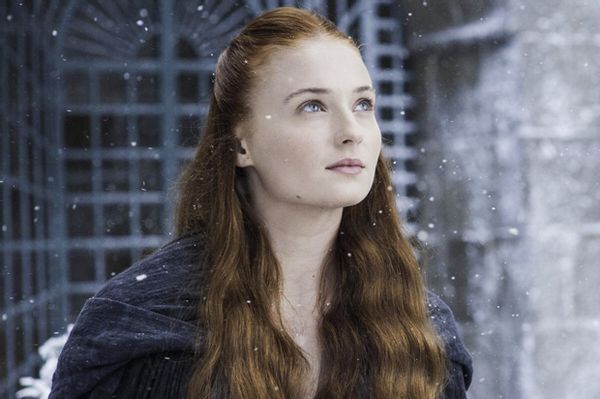
"Big Mouth" (Season 1, Episode 2 – 2017)
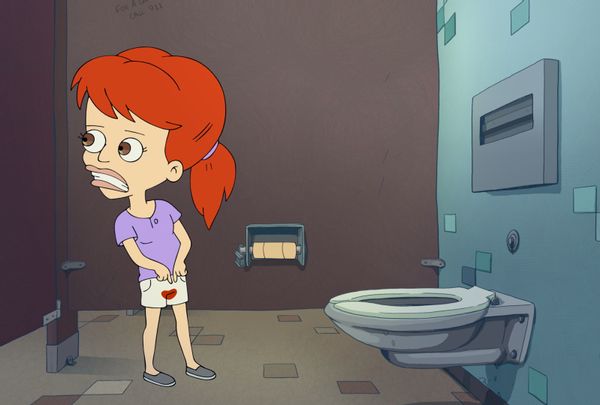
RELATED: How period humor is changing the world
"Black-ish" (Season 4, Episode 6 – 2017)
The scene: In "First and Last," a brave Diane (Marsai Martin) is the first person in her class to get her period and is forced to change into sweatpants sourced from the lost and found. In flashback, we see how her family's matriarchs navigate the period talk with their daughters. First, Ruby Johnson (Jenifer Lewis) gives Rainbow (Tracee Ellis Ross) the "talk" in full shaman garb, blowing a horn and proclaiming, "May the sacred flow of your menses topple the patriarchy and bind you to the goddess!" Years later, Rainbow's talk with Zoey (Yara Shahidi) is a bit more, well, clinical. "This is a beautiful thing honey," she says, pointing to an anatomical screen display. "Your uterine lining is decaying and then sloughing off and then turning into blood as it moves out of your vaginal canal." Zoey looks on in horror.
Verdict: Written by Laura Gutin Petrson and directed by Linda Mendoza, this episode of "Black-ish" reflects the challenges of mother-daughter dialogue during a formative period and conveys the ways in which generational understanding of gender roles and femininity inform these conversations.
"Baby-Sitter's Club" (Season 1, Episode 8 – 2020)
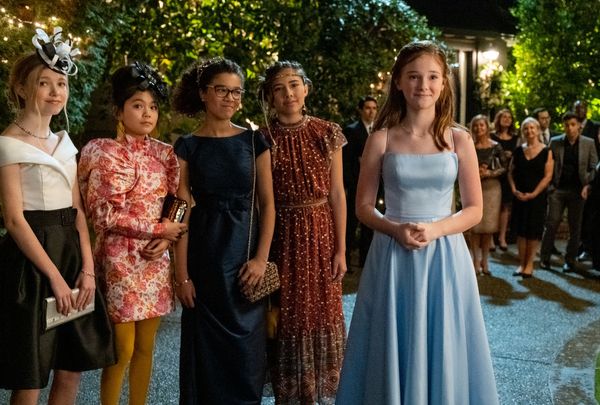
"PEN15" (Season 2, Episode 5 – 2020)
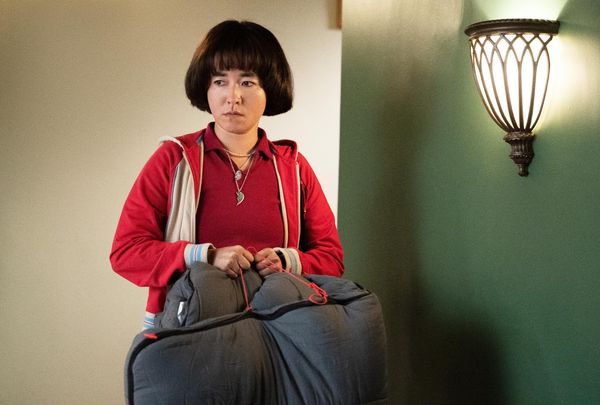
"The Queen's Gambit" (Season 1, Episode 2 – 2020)

"Creamerie" (Season 1, Episode 4 – 2021)
The scene: In this dark and delightful Kiwi comedy set in a future where men have died off from a virus, friends Alex, Jaime and Pip (Ally Xue, J.J. Fong and Perlina Lau) attend Syncfest – an annual celebration of menstruation – that includes the Menstrual Cycle ferris wheel, Mooney the menstrual cup mascot, and best of all, a Menarche Tent where a young person's "first bleed" is congratulated and feted with a gift bag, including a complimentary hot water bottle. Score!
Verdict: This is the sort of celebration and everyday, transparent treatment that menstruation should have in our real world, instead of teaching young folk that their bodies are scary, foreign or shameful. Imagine what such an open dialogue would do for everyone, such as banishing misconceptions about periods emanating from the butt. Plus: free tote bag!
"Turning Red" (2022)

More stories to read:
- Period pride takes pop culture by storm
- We were American girls: What Addy taught me about Black hair, freedom and myself
- Instagram has a problem with women: Bloody accident photos are fine but periods are "inappropriate"?
- Bo Burnham refused to edit R-rated "Eighth Grade" into PG-13 and advises teenagers to "sneak in"







